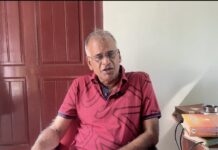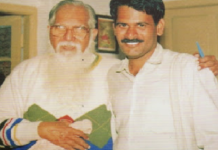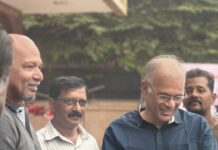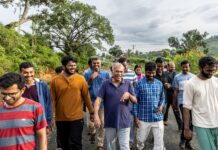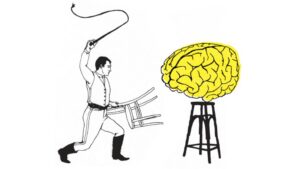
Dear J,
In a recent speech, you advised dedicating at least an hour daily to a task that requires significant effort. This seems to run counter to the ubiquitous “follow your passion” mantra we’re all so familiar with. Your suggestion struck me as rather unconventional. What’s the reasoning behind it? I’m hoping you can shed some light on this to help clear up my confusion.
(As a side note, I previously reached out to you about some personal issues. Your response to my inquiry about online classes was particularly stern.)
Best, M
Dear M,
There are instances where I have to be stern. Some people construct a convenient position or opinion and use it as a curtain, blocking any new idea that presents itself to them. They’ll pretend it is a ‘debate’ about an ‘ideology’.
There’s no point in arguing with such individuals. Debating will only end with them digging their defenses deeper. Instead, I try to tear up their curtain and show them where they truly stand. I don’t mind if they take offense. It’s great if they are able to catch a glimpse of their real selves. If they’re insulted and walk away, so be it. There’s nothing more I can say or do for them.
Recently, a friend of mine—a journalist and a literary person—suffered a stroke. The ordeal left him with a severe case of amnesia. After initial treatment in India, he went to America for further medical care. There doctors advised him to challenge his brain with tough tasks. He took up software programming. He told his teacher, “I’m not learning this for a job. I don’t even like math. I’m doing this to kindle my mind.” He engaged in research, comparing words in the Malayalam dictionary. He engaged himself in reading literature and listening to music. He regained his mental acuity remarkably quickly.
Each of us aspires for a “comfortable” life. Most of us struggle with this until our forties. (Some don’t even have this struggle. For several women, such a struggle doesn’t occur throughout life.) At some point, we settle in. Everything falls into place. After that, there are no more challenges or struggles. Worries and tensions remain, many of which are merely products of our imagination.
With modern day economic development, most middle-class individuals can easily reach this level of comfort. Life reaches a stage where neither body nor mind engages in any significant exertion. Nothing is more dangerous to a person’s health than this torpor. It’s like keeping an machine untouched and idle for years.
Recently, doctors have started criticizing physical inactivity and emphasize physical exercise. As a result, one can spot people walking and exercising in the early morning. However, according to reports from my friends in the medical field, not even 10 percent of those who receive this advice end up exercising regularly. They’ll do it for a while and then stop.
The real reason behind this is that physical inactivity isn’t merely a physical condition. It is psychological as well. One can’t keep the body energetic without a vibrant mind. If you keep your mind vibrant, your body will naturally follow suit. To keep the mind in that state, the necessary training should be in place.
Until recently, doctors used to advise patients, “Do not get stressed, stay calm, and don’t attempt to interfere in things in general.” They meant it for “peace of mind,” which they deemed essential for health in medical terms. But following this advice invariably leads to mental lethargy. It is only a lethargic mind that tires easily. From fatigue arises anxiety. It’s only after “retirement” that several people turn agitated, upsetting themselves and others.
Many believe nowadays that living with minimal mental, cognitive, and physical exertion of any sort is a recipe for a good life. They believe that sticking to a good daily routine is sufficient. One can notice this when people mention their “routine” when discussing their health, detailing everything from their sleep to their diet. It’s nothing but a picture of a life of torpor, a breeding ground for disease.
This mentality is a remnant of our old feudal days. The poor had to work hard with their body and soul, while the wealthy lived a life of indolence, doing nothing and indulging in pleasures. Laziness was considered a mark of aristocratic life. Today, the middle class can afford this lifestyle. They imagine themselves to be aristocrats and end up living indolent lives.
I once asked my friend who is a doctor, why people don’t stick with exercise. “They’ll have minor physical ailments,” he explained. “They use these as excuses to avoid exercise. The ailments are often due to lack of exercise. It’s a vicious cycle, and most of them are trapped in it.”
“Can’t you explain this to them?” I asked.
“It’s very difficult,” he replied. “They need mental training. They’ll make all kinds of excuses to keep their body and mind untouched by any form of exertion. It’s hard to break through. Also, it’s not the job of a doctor.” He added, “There exist exercises that take into account such ailments. Doing them would cure them of those conditions too. For pains such as back pain and joint pain, exercise is the solution. But patients won’t do those exercises. They’ll seek medication for the ailment instead.”
There’s a great void that pervades the minds of those leading indolent lifestyles. They fill that void with thoughts about disease. They want to discuss their diseases and one could even say they have found a taste for disease. Their inner lives are led by thoughts of disease. They talk about medical treatment only to dwell upon disease.
The root cause of all these ailments is the inertia of the mind. I advocate intense exertion of the brain as a discipline, as a means to eliminate it. This isn’t just my idea; it’s a method recommended worldwide today. In modern times, our cognitive ability is bereft of will like cows idling in the road. I am talking about horsewhipping them into activity.
(2)
We all have an idyllic lifestyle in mind: a favorite place, pleasant fare to taste, great music, mild activities that are fun to do. This is akin to little children that dream of eating chocolates for every meal. Such a life might help you relax for a few days. If anyone attempts to live like this permanently, they’ll become ill within a couple of years.
When BSNL (a government-run telco firm in India) began to decline, several employees opted for voluntary retirement. Most of those who did so fell ill within a few years, especially women. Trade union-led studies about this phenomenon have happened in the state of Kerala. Those findings are now offered as advice to those who consider voluntary retirement: “Don’t rest, stay active, keep doing something.” My friends in Kerala formed an organization to help retirees stay active. I was invited to inaugurate the initiative.
Here’s what is happening. From our childhood, we’re accustomed to exerting our bodies and minds only when absolutely necessary. We’ll walk a little if it is unavoidable. We will skip it if we have a two-wheeler within reach. We educate ourselves with the sole objective of employment. We do not learn about anything else for any reason. Once we find a job, we stop learning altogether. So, unless there is a daily need to exert the body or mind, we do nothing. We preserve the body without any exertion and do the same for our minds.
Our modern houses are built in the Western style, suited for colder climates where people must live indoors for half the year. They built houses with several rooms and with various facilities for sitting and lying down. We have the same style of houses with those facilities here today, leading us to live mostly indoors. We can stay within our homes for weeks. Many people dislike going out, and complain about dust, smoke, and noise. But in the West, homes also have personal gyms. We don’t have it. Our bodies have grown accustomed to a cosseted life.
The human mind seeks entertainment. We began spending money on entertainment starting from the 18th century. Later entertainment turned into a huge business. Any business will attempt to get the consumer hooked, and today, the entertainment industry leads in addictive content. Cinema, TV, and now the Internet are designed to make us spend time without realizing it. We are not permitted to pay close attention to these; because if we did, we would get tired and disengage. Hence they are carefully designed to keep us hooked without tiring the brain.
Today’s media has evolved to the point where, as the entertainment business competes, it’s enough for consumers to merely watch and do nothing. Even news debates are superficial and unmemorable. Opinion pieces are limited to five hundred words. Videos have shrunk from an hour to forty minutes, twenty minutes, five minutes, and now to thirty seconds. It’s mere gossip that fuels most of what passes for entertainment.
These are also a type of cushion – for the brain. The brain languishes in inertia. We keep scrolling and watching, but don’t even remember what we saw. We won’t even realize how a day flew by. We think we’re living a happy and relaxed life. But our bodies are becoming ill from laziness, which is not visible at first. Surprisingly, when disease is detected, it would not even occur to us that it is related to this lifestyle.
For example, back pain, joint pain, neck stiffness, shoulder pain, and stomach disorders like indigestion and acidity. Problems like dizziness. All of these have origins in such a lifestyle. The first among them are sleep disorders. One might spend a long time in bed, but without sufficient deep sleep. As a result, the muscles don’t get enough rest and digestive organs don’t function properly.
Insomnia is caused by insufficient exertion of the brain. But at the same time, this condition can also make the brain unable to function. One loses the ability to pay close attention to anything for a stretch of time. One can’t read beyond a hundred words. Even then, one can only read what’s already known and cannot understand new concepts. One can’t watch anything continuously for ten to fifteen minutes.
(Television programming researched this and then introduced 15-minute intervals. Recent studies show that even this is too long. A media expert told me that the average attention span is a mere 2 minutes. On average, viewers of OTT films stop and do something else every seven minutes he said. Hence scripts should include new twists every seven minutes.)
Social media was created with this in mind. Only the present exists there. You can go over there and upload pictures from your daily life. You can argue in fights about politics and cinema. You can unleash venom on anyone citing any reason. It’s like a nameless person wandering in a crowded market. One can be everywhere and nowhere at once.
This kind of lethargy causes an shocking loss of memory. We can’t remember anything beyond a day or two. If one watches a movie and then happen to watch the same movie a month later, one doesn’t recollect the story. Several people watch video shorts over and over again. Even in day to day conversations, small details slip our minds. Hence conversations themselves become generic and long winding.
Most people don’t realize how embarrassing it is to admit that they do not recollect something. There are people who proudly state “I have a poor memory, sir” as if it were a badge. The inability of the mind to retain anything is considered to be proof of its pristine nature.
Once disease catches up, caused by laziness, they actually blame the disease for their laziness. After that, they organize their lives around disease, medication for said disease, and fellow afflicted souls of the same disease.
The victim of laziness can escape the clutches only if he himself develops a resolution. A friend who is a doctor told me, “I advise my patients to exercise and to exert the brain. I tell them that superficial, indolent physical and mental lifestyles are causes of disease. If they interject with ‘But Doctor…,’ that’s it—they cannot recover. They will start making excuses. There are some who are jolted with that revelation, and those are the ones that can escape it.”
That’s why I advocate mental exertion. Because that’s the starting point. At least an hour of intense mental exertion should be there every day. It’s equivalent to training the body like lifting weights or running. This mental exertion will increase our focus. It stimulates chemicals that boost our brain’s activity. After that, we will be able to complete other mental tasks rapidly. An exercised brain cannot be turned dull. It follows the same rule as the body. A person who runs five kilometers in a day will remain active for the rest of the day.
I have been learning this for myself for a while now. Writing fiction is exciting to me. But I perform activities that really exert the brain for at least two hours every day. Here is what I did today. After reading four different books, I created a very detailed Tamil wiki entry and two sub-entries about Mr. V. Kalyanasundhara Mudaliar. I read four parts in The Norton Anthology of Theory and Criticism and took notes for my understanding. These above are not for my literary work.
All the training sessions that are conducted by Unified Wisdom with the help of friends and the guidance of teachers are for this purpose alone. It is to afford an opportunity for those who are interested, to gain training in art, literature, culture, and philosophy so that they can seriously engage themselves in something. To address internal and external issues that might arise in the process, we have sessions on yoga and meditation.
When I look at my site (www.jeyamohan.in), it appears I have been repeating this for twenty years. That is the reason why I write a book of twenty-five thousand pages in an environment where the number of people who don’t read more than a hundred words is increasing. This is also why I am against online classes. “Online class” is just a delusion that props up a lazy attitude. I want to help only those who break free from their addiction to lethargy.
I am not addressing people who are lazy; I am talking to people who break free from it. I am travelling in the exact opposite direction of today’s general situation. I think this is the need of our time.
J

